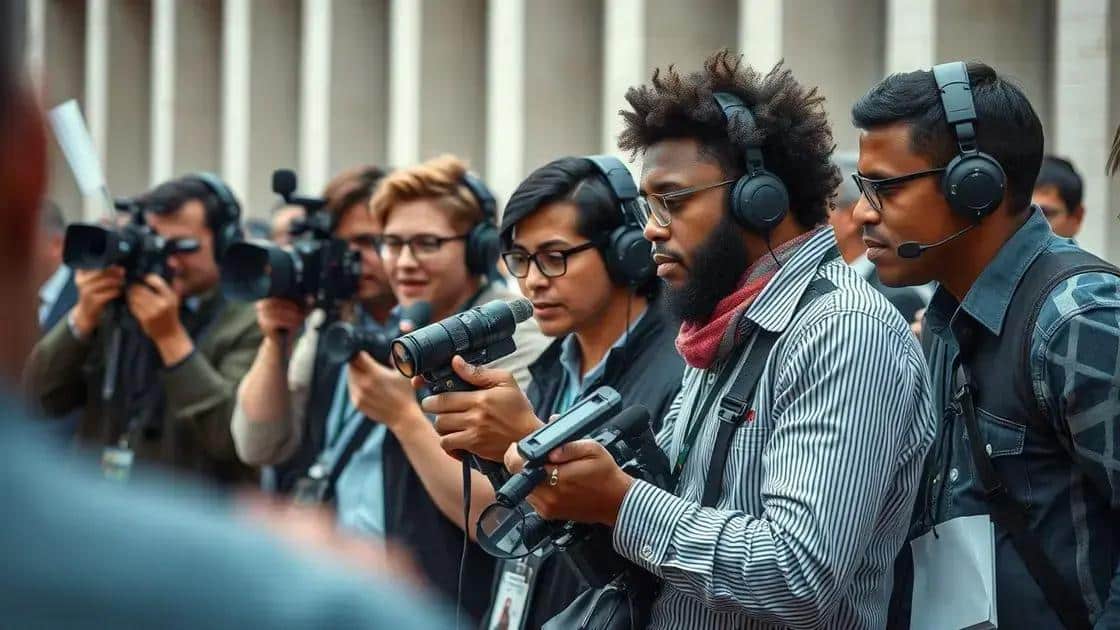Press freedom rankings 2025 announced: what you need to know

The press freedom rankings for 2025 reveal the state of media freedom worldwide, highlighting key countries, future trends, and the impacts of technology and activism on journalism.
Press freedom rankings 2025 announced provide a startling look at the current state of media around the world. As these rankings reveal shifts in press freedom, it’s crucial to understand what they mean for democracy and public discourse.
Overview of the 2025 rankings
The 2025 rankings offer a comprehensive overview of how press freedom is faring worldwide. With each year, these rankings provide critical insights into the media landscape, reflecting both progress and setbacks. Understanding these rankings is essential for grasping the current state of free speech and journalism.
Major Trends in the Rankings
Countries around the globe have shown varying degrees of adherence to press freedom principles. Notably, some countries have improved their scores significantly, while others have seen declines. This fluctuation often corresponds with political changes, legislative reforms, or social movements advocating for rights.
Top Performing Countries
- Country A: Known for its strong legal protections for journalists.
- Country B: Promotes independent media and has a vibrant press culture.
- Country C: Saw improvements due to recent reforms enhancing freedom of expression.
As we analyze the 2025 rankings, it becomes evident that certain factors continuously affect press freedom worldwide. Economic stability, public demand for transparency, and the presence of strong civil societies play crucial roles.
Meanwhile, the rankings shed light on unfortunate trends as well. Countries experiencing political unrest tend to have declining scores, illustrating the dangers that journalists face in hostile environments. Issues such as censorship, threats, and violence create a challenging atmosphere for media professionals.
Implications of the Rankings
The implications of the 2025 press freedom rankings extend beyond mere numbers, influencing how civil society engages with the government. High scores in rankings can bolster public trust in institutions, while low scores often incite activism and calls for reform.
As the public becomes more aware of these rankings, they may demand better protections for journalists, ensuring a freer media landscape. The future of journalism depends heavily on societal engagement and advocacy for press freedoms. It remains vital to keep track of these trends, as they shape our understanding of democracy and accountability.
Key countries and their scores

In the 2025 press freedom rankings, several countries stand out for their remarkable performance. Understanding their scores helps illuminate the factors that contribute to a healthy media environment. High-ranking nations often have strong legal frameworks that protect journalists and encourage free expression.
Top Scorers
Countries like Finland, Norway, and Sweden continue to lead the way in press freedom. These nations consistently score high due to their commitment to journalistic independence and the absence of censorship. This favorable environment allows a diverse range of voices to be heard.
- Finland: Maintains high levels of media freedom through strong laws.
- Norway: Promotes transparency and protects journalists from harassment.
- Sweden: Supports a vibrant press community with fewer restrictions.
Conversely, several countries face significant challenges. Nations such as North Korea and China rank near the bottom of the list due to strict government control over the media. In these regions, journalists often operate under severe threats, facing imprisonment or censorship.
Overall, the rankings reveal how important it is for governments to create conditions that safeguard press freedom. By examining the scores of various countries, we gain insights into how different policies and cultures impact media operations. Understanding these dynamics is crucial for fostering a global dialogue about free speech and democratic values.
Impacts on Journalism
The scores assigned to these countries do not just reflect their current state but also hint at possible future trends. Improvements in one country can inspire reforms in others, while declines often prompt international scrutiny. Journalists and activists continually strive for better protections and freedoms, demonstrating the vital role of media in democratic societies.
Impacts of rankings on global media freedom
The impacts of rankings on global media freedom are far-reaching and significant. When countries receive their press freedom scores, it can affect both public perception and government policies. This score not only reflects the current state of journalism but also influences how nations are viewed on the global stage.
Public Awareness and Activism
High or low rankings often spark discussions among citizens and the media. In countries with low scores, there is typically an increase in activism, as people push for reforms to improve press freedoms. Awareness about these rankings can mobilize civil society and lead to greater accountability from governments.
- Activism often increases as citizens demand change.
- Media organizations may rally together to advocate for their rights.
- Public campaigns for press freedom can gain traction with higher visibility.
The rankings also serve as a tool for international organizations and watchdogs to apply pressure on governments. Countries striving to improve their scores might implement reforms to strengthen legal protections for journalists.
International Relations
Additionally, a country’s ranking can impact its international relations. Nations with high scores are often seen as more democratic and open, which can strengthen diplomatic ties. Conversely, countries with poor press freedom rankings may face criticism from other nations and international bodies.
This dynamic creates a feedback loop where improved press freedom can lead to better international standing, which in turn encourages more robust journalism environments. As nations see the benefits of a free press reflected in their international relationships, they may be more motivated to make necessary changes.
The rankings are thus a critical component of the global dialogue on human rights and democracy. They provide insight into the ongoing challenges journalists face and highlight the need for continued vigilance in preserving media freedom around the globe.
Future trends in press freedom

The future trends in press freedom are pivotal for understanding how journalism may evolve in the coming years. As technology and society’s values change, the landscape of media freedom is expected to shift significantly. This shift can bring both challenges and opportunities for journalists worldwide.
Technology’s Role
Advancements in technology play a crucial role in shaping the future of press freedom. Digital platforms have become essential for news distribution, allowing information to reach wider audiences. However, this also presents challenges, as governments may seek to regulate online content.
- Increased use of social media for news dissemination.
- Growing concerns over privacy and data protection for journalists.
- Emergence of deepfake technology affecting credibility.
With the rise of artificial intelligence, media organizations are finding new ways to engage audiences. AI can assist in reporting, fact-checking, and analyzing trends. Nevertheless, the ethical implications of using AI in journalism must be addressed to maintain trust and credibility.
Shifts in Global Attitudes
Another trend is the shift in global attitudes toward press freedom. More people are recognizing the importance of a free press in protecting democracy and human rights. This growing awareness can lead to increased demand for transparency and accountability from governments.
As movements advocating for press freedom gain momentum, laws may evolve to offer better protection for journalists. In some regions, citizens may push back against censorship by demanding reforms that promote freedom of expression.
Engagement from the public is crucial to fostering an environment where journalism can thrive. When people actively support press freedoms, it enhances the safety of journalists and the quality of information available.
The future of press freedom also hinges on international collaboration. Organizations advocating for media rights can work together to provide support in oppressive regimes. By fostering alliances across borders, they can challenge attempts to stifle press freedoms globally.
In conclusion, understanding the state of press freedom is essential for fostering democracy and protecting human rights. The 2025 rankings reveal significant insights into how different countries approach media freedom. Advances in technology, shifting global attitudes, and increased public activism all play vital roles in shaping the future of journalism. By remaining engaged and advocating for press rights, individuals and organizations can help create a more open and informed world. As we look ahead, the responsibility lies with both governments and citizens to support a vibrant media landscape that upholds democratic values.
\n\n
| Topic | Details |
|---|---|
| 🌍 Global Perspective | Media freedom impacts democracy and human rights worldwide. |
| 📈 Future Trends | Technological advances will reshape the journalism landscape. |
| ✊ Activism | Public demand for press rights can drive change. |
| 🤝 International Collaboration | Alliances can strengthen media freedom across borders. |
| 🔒 Legal Protections | Improved laws can enhance journalist safety. |
\n
FAQ – Frequently Asked Questions about Press Freedom Rankings
What are the press freedom rankings?
The press freedom rankings assess the level of freedom journalists have in different countries, measuring various factors like censorship and legal protections.
How do the rankings impact global media?
The rankings influence public awareness and activism, prompting people to demand better press freedoms and hold governments accountable for their media policies.
What role does technology play in press freedom?
Technology can both enhance and challenge press freedom, offering new platforms for information dissemination while also posing risks of government regulation and censorship.
Why is press freedom important for democracy?
Press freedom is crucial for democracy as it allows for transparency, facilitates informed public discourse, and holds power to account by exposing corruption and abuses.






